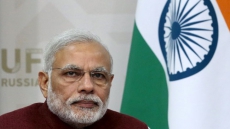India on Tuesday summoned the Pakistani envoy and served a "strong demarche" against continued cross-border terrorism, as bilateral ties took another dip.
Days after India and Pakistan clashed over the turmoil in Kashmir at a Saarc meet in Islamabad, Foreign Secretary S. Jaishankar summoned Pakistani High Commissioner Abdul Basit and "issued a strong demarche on continuing cross border terrorism from Pakistan" a Ministry of External Affairs statement said.
The demarche made specific reference to LeT (Lashkar-e-Toiba) terrorist and Pakistan national Bahadur Ali who was apprehended recently, MEA spokesperson Vikas Swarup said.
The demarche stated that Pakistani national Bahadur Ali alias Abu Saifullah was arrested by Indian authorities in Jammu and Kashmir on July 25 along with weapons, including an AK-47 rifle, live rounds of ammunition, grenades and grenade launcher, as well as sophisticated communication equipment and other material of Pakistani and international origin.
It said Bahadur Ali, born on December 17, 1995, is son of Mohammed Haneef, a resident of Jia Bagga village in the Lahore district of Pakistan's Punjab province.
"Bahadur Ali has confessed to our authorities that after training in Lashkar-e-Toiba camps, he was infiltrated into India," the demarche said.
"He was thereafter in touch with 'operations room' of LeT, receiving instructions to attack Indian security personnel and carry out terrorist attacks in India."
The demarche said India "strongly protests against the continued infiltration from Pakistan of trained terrorists with instructions to carry out attacks".

This was contrary to assurances given by Pakistani leaders at the highest level, it added.
It also said that Bahadur Ali wrote to the Pakistan High Commission in New Delhi seeking legal aid and assistance to meet his family.
"We are prepared to grant the Pakistan High Commission consular access to Bahadur Ali," the demarche concluded.
The Indian action comes less than a week after a Saarc ministerial meet in Islamabad saw the bilateral tensions over Kashmir come to the fore. Pakistani Interior Minister Chaudhry Nisar Ali Khan had slammed the "use of excessive force", referring to the unrest in Jammu and Kashmir, while Indian Home Minister Rajnath Singh criticised the "glorification of terrorists as martyrs".
Both sides did not hold a bilateral meeting, and Rajnath Singh also did not stay for a lunch for the Saarc interior ministers as his Pakistani counterpart, despite giving the invite, left early.
Pakistan had also observed a Black Day last month to protest the deaths in Jammu and Kashmir and also termed Hizbul Mujahideen commander Burhan Wani a "martyr".
The killing of Wani on July 8 has led to a spiral of protests and violence in Kashmir, leaving over 50 people dead in clashes with security forces.





